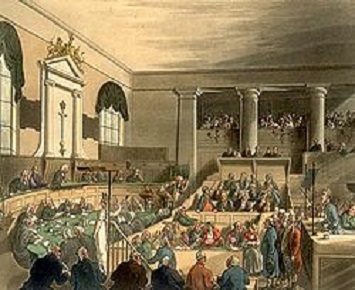Live in USA
 |
A court is a tribunal, often a governmental institution, with the authority
to adjudicate legal disputes between parties and carry out the administration of
justice in civil, criminal, and administrative matters in accordance with the
rule of law.1 In both common law and civil law legal systems, courts are the
central means for dispute resolution, and it is generally understood that all
persons have an ability to bring their claims before a court. Similarly, the
rights of those accused of a crime include the right to present a defense before
a court.
The system of courts that interprets and applies the law is
collectively known as the judiciary. The place where a court sits is known as a
venue. The room where court proceedings occur is known as a courtroom, and the
building as a courthouse; court facilities range from simple and very small
facilities in rural communities to large buildings in cities.
The practical
authority given to the court is known as its jurisdiction (Latin jus dicere) ĘC
the court's power to decide certain kinds of questions or petitions put to it.
According to William Blackstone's Commentaries on the Laws of England, a court
is constituted by a minimum of three parties: the actor or plaintiff, who
complains of an injury done; the reus or defendant, who is called upon to make
satisfaction for it, and the judex or judicial power, which is to examine the
truth of the fact, to determine the law arising upon that fact, and, if any
injury appears to have been done, to ascertain and by its officers to apply a
legal remedy. It is also usual in the superior courts to have attorneys, and
advocates or counsel, as assistants,2 though, often, courts consist of
additional attorneys, bailiffs, reporters, and perhaps a jury.
The term "the
court" is also used to refer to the presiding officer or officials, usually one
or more judges. The judge or panel of judges may also be collectively referred
to as "the bench" (in contrast to attorneys and barristers, collectively
referred to as "the bar"). In the United States, and other common law
jurisdictions, the term "court" (in the case of U.S. federal courts) by law is
used to describe the judge himself or herself.
The word cour comes from the
French court, an enclosed yard, which derives from the Latin form cortem, the
accusative case of cohors, which again means an enclosed yard or the occupants
of such a yard. The English word court is a cognate of the Latin word hortus
(meaning "garden," hence horticulture and orchard), both referring to an
enclosed space.4
The meaning of a judicial assembly is first attested in the
12th century, and derives from the earlier usage to designate a sovereign and
his entourage, which met to adjudicate disputes in such an enclosed yard. The
verb "to court", meaning to win favor, derives from the same source since people
traveled to the sovereign's court to win his favor.
Jurisdiction, means "to
speak the law," is the power of a court over a person or a claim. In the United
States, a court must have both personal jurisdiction and subject matter
jurisdiction. Each state establishes a system of courts for the territory under
its control. This system allows cases to be heard before courts or authorized
individuals by granting both civil and criminal jurisdiction (in the United
States, this is termed subject-matter jurisdiction). The grant of power to each
type of court or individual may stem from a provision of a written constitution
or from an enabling statute. A case brought before a U.S. court that does not
have the authority to hear that case may be dismissed solely for lacking
jurisdiction. In English law, jurisdiction may be inherent, deriving from the
common law origin of the particular court.
Download